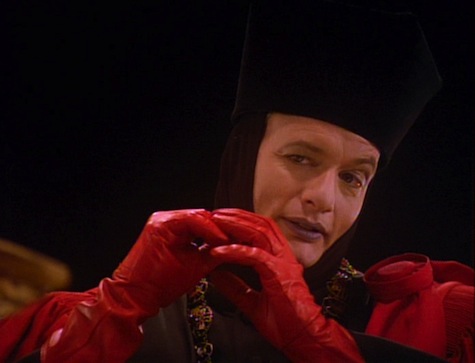“What is a ‘Q’?”
“It’s a letter of the alphabet as far as I know.”
–Worf & Tasha Yar
“She’s found a vulnerability in you… a vulnerability I’ve been looking for years. If I had known sooner, I would have appeared as a female.”
–Q to Picard
Magnificent Bastards aren’t villains. Or, more to the point, they aren’t just villains. They have to have some complication and flair that catch your attention; some motivation that makes them at least as interesting as the protagonist. We wouldn’t care about Loki if he didn’t have a solid case for being pissed at all of Asgard.
Enter Star Trek: TNG’s Q. To me, Q is one of the great examples of digging at a character until you find gold. So what makes him so great? Much as de Lancie’s character on Breaking Bad gave audiences a whole new angle on Walter White, so Q ends up being the very making of his BFF, John Luck Pickerd.
His obvious predecessor is Trelane, the titular “Squire of Gothos” from The Original Series. As has been mentioned elsewhere, Trelane qualifies as a Magnificent Bastard in his own right, and explaining his behavior by saying he’s a young Q completely agrees with the behavior Q’s son (Q2? Q? Qunior?) displays in the Voyager episode “Q2.” Trelane could never become a recurring character on TOS because Kirk already had flamboyance pretty well fucking covered, thank you.
And since the central relationship of TOS is the complicated love that Kirk and Spock feel for each other, there was no need for another antagonist. So we get the god-like character exposed as the petty little boy he is, by even larger god-like characters, in a literal deus ex machina.
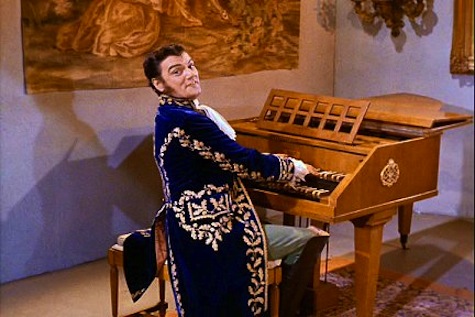
But, when TNG came around, the writers wanted to take another look at what that character could do. At least, that’s de Lancie’s theory, and so a “God with clay feet” was born. In an interview for the Star Trek 25th Anniversary Special, de Lancie said that, “upon thinking of ways to describe Q’s character, he had remembered a famous quote made about Lord Byron: that he was ‘mad, bad, and dangerous to know’.”
On paper, Q should not work. He’s the sort of fictional creation that 8th grade boys and brand-new fanfic writers pride themselves on—He can do anything! He’s the strongest creature in the universe! And, just when you think you’ve got him, he comes up with some snarky line cause he’s also, like, the funniest person ever!
And yet.
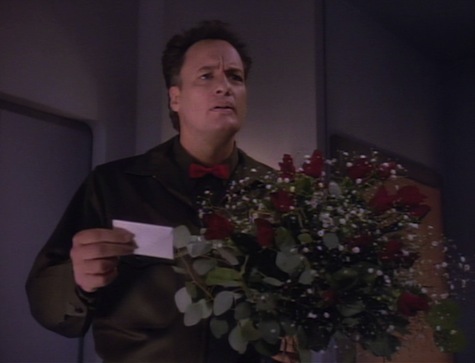
Q’s attitude and snark would already qualify him for Magnificent Bastardom, but on top of that you’ve got omnipotence, shape-shifting, and that amazing fashion sense.
But here’s what makes him a truly magnificent bastard—he is the most important person on the show, but you don’t even find that out until the last ep. In one giggling sentence he reveals the truth to Jean-Luc Picard—The Q Continuum wanted the humans destroyed. They wanted to put them on trial with no hope of winning. But instead Q showed up to give them a helping hand.
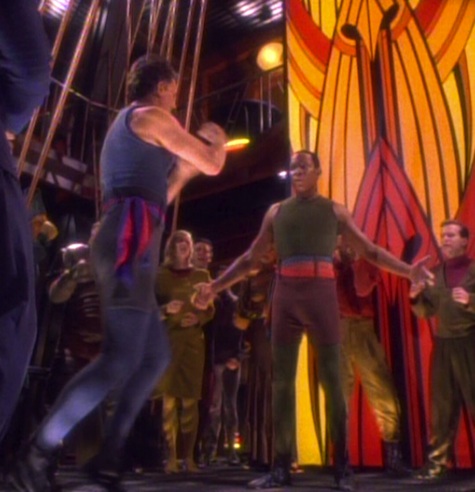
Q was a bit of a Magnificent Bastard on DS9, but his essential characteristic is playfulness—and Sisko was never going to play along. Instead he just punches Q in the gut, and then ignores him until he leaves. Neither of them come off well by the end of the episode—Sisko seems even more dour than usual, and, robbed of a sparring partner, Q’s just a jerk.
And his relationship with Janeway seemed to morph into a semi-serious crush by his second appearance on Voyager—maybe because she stood up to him? Maybe because she fought the Borg on her own? But he still can’t establish the sort of snarky dance he does with Picard, because he has to contend with Chakotay’s straightforward jealousy. The sexualization of their relationship forces it to conform to a battle-of-the-sexes type arc that, while fun to watch, is never going to reach the heights of his time on TNG.
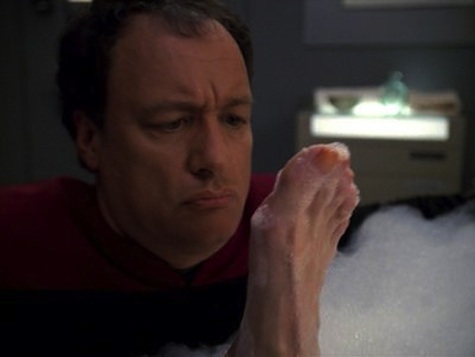
And it’s a mark of his Bastard-dom that not even fatherhood softened him—he was perfectly willing to put his son (and Janeway, and poor Neelix) through utter hell in order to teach him how to be a better Q, but by then he was just a supporting character to his son’s arc. It’s only in TNG that Q finds a worthy partner, in Jean-Luc Picard.
Picard is reserved, dignified, intellectual—the only thing that doesn’t make sense is his desire to explore space on the Enterprise. Honestly, in “All Good Things…” when we learn he’s become an ambassador, that title made an audible click in my mind—of course Jean-Luc becomes an ambassador! But the exploration thing—what is that? And I think that the point of Q was precisely to bring that element out. Picard doesn’t have to test himself against Riker—he’s Riker’s superior. He doesn’t have to test himself against Data—of course Data’s going to be correct! So he simply turns to him when he needs his insight, and tries to provide the best example of humanity he can. And Picard is such an old school chivalrous gentleman that he can’t have the same sort of interplay with women—he’s always flirting a bit. So then Q shows up, and provides a real challenge, a sparring partner, someone who forces him to examine why it is exactly that he wants to go into space. It isn’t just for the betterment of humanity, and it isn’t just to meet other races and species. Jean-Luc is going to push himself, because he wants to believe that if he lives up to the ideals he regularly proclaims to his crew, those ideals will become the truth. He wants to prove to himself that he can do this, and it’s Q who gives him the opportunity.
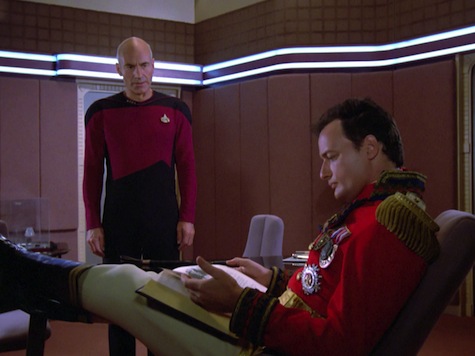
Q’s very first appearance seems to be a mistake, an annoying trickster god interrupting the main flow of the plot, and even re-watching the episode it feels this way. I found myself getting irritated as the episode went on—I just wanted them to get to Farpoint already. The trial at first seems like a petulant attempt to hold humanity back. But they find that their actual mission at Farpoint is much more vital and unusual than they could have known (space jellyfish romance!!!) which they probably only realized because of Q’s intervention. But the trial becomes more and more serious, Q presenting them with the worst moment in humanity’s history. We get the sense that Picard is the only human who could stand up in humanity’s defense here. He’s buying our species time, and he’s winning Q’s respect.
If we want to consult Keith R.A. DeCandido’s Star Trek novel Q&A for a moment, “Q&A establishes that Q was sent by the Continuum to give Picard the power of the Q, as a test of humanity’s ability to save the universe eventually, but Q disregarded their directive and gave the Q power to Riker.” This is why in his second appearance, “Hide and Q” he tempts Riker—he knows he’ll never get Jean-Luc. He could see Riker’s (slight!) douchiness as the possible inroad to breaking the humans, seeing their worst points. So, when he fails, Riker doesn’t even turn Q down. He just looks at his Captain.
Riker: I feel like such an idiot.
Picard: Quite right, so you should.

In “Q-Who?” Picard’s scoffing at Q is what gets them into trouble in the first place: “The chance to study you is, frankly, provocative, but you are next of kin to chaos.” He and Q battled with Shakespeare quotes, but apparently Jean-Luc should have brushed up on Greek mythology. Or Hinduism. Or the Hebrew Bible. So Q introduces them to the Borg to give Picard an idea of what true horror waits for them. While his actions in “Q-Who?” seem horrific at first glance (made far worse by Q’s comparing the encounter with the Borg to a “bloody nose”) even Picard seems grateful for the warning, and Q also finds something new in Picard to interest him:
“That was a difficult admission. Another man would have been humiliated to say those words. Another man would have rather died than ask for help.”
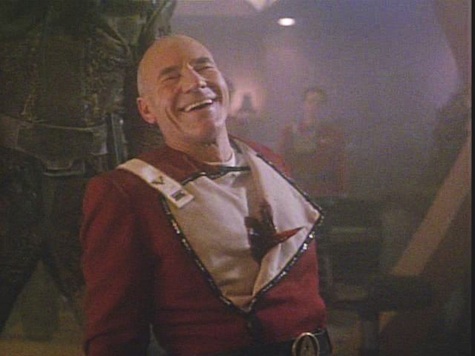
When Picard’s real test comes in “Tapestry,” Q knows exactly how to trip him up, and offers him a chance to be more sensible young man. Picard takes the bait, because older, wiser Captain Picard has learned from life, and wants to apply his wisdom to his former life. But it never occurs to him that without his adolescent Kirkiness he never would have gained all that wisdom. Q already knows Picard well enough to know that.
“Tapestry” has two basic ideas at its heart—one is that when Picard was dying, it was Q who stepped in to save him. (This set-up also implies that Q, an omnipotent immortal, would willingly spend an eternity with Picard, should he choose to die rather than alter the past.) The other possibility is that Picard, as he thinks he’s dying, hallucinates not a past lover, or Beverly, or even Riker as the one person who greets him in the afterlife, but Q. What does this say about the actual esteem our Captain has for him? For all his protestations that Q is not God, if this is all just Picard’s imagination, it’s his imagination that’s giving him dominion over life, death, and time. But what makes Q a magnificent bastard rather than just a bastard, is not just that he gloats over Jean-Luc—which he obviously does. It’s that he takes the opportunity to show the Captain who he truly is. Picard mocks him at the beginning of the episode, saying, “I find it hard to believe that you are doing this for the benefit of my soul!” and yet that’s precisely what Q is doing.
Picard: “You’re right, Q. You gave me the chance to change, and I took the opportunity. But I admit now—it was a mistake!”
Q: “Are you asking me for something, Jean-Luc?”
Picard: “Give me a chance, to put things back the way they were before.”
Q: “Before, you died in sickbay. Is that what you want?”
Picard: “I would rather die as the man I was… than live the life I just saw.”
(Q nods approvingly.)
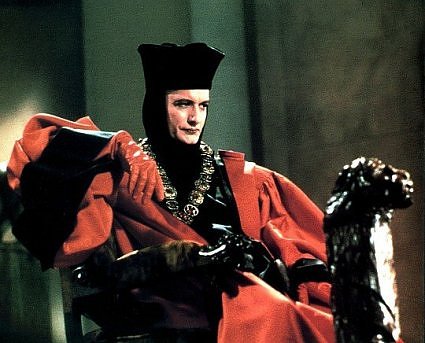
In “All Good Things” we learn the human’s trial never ended. Q comes back in full judge regalia, and is as mean and biting as ever, still hurling the same insults at humanity (“It’s time to put an end to your trek through the stars“ for one incredibly subtle example…). But, after seven years, he respects Picard enough to give him a shot, and after a few nudges from Q, and a trip back in time to see the ”goo“ from whence we all came, the Captain solves the puzzle, and stops the anomaly from wiping out all of humanity. No pressure.
Picard: “You had a hand in helping me get out of this.”
Q: “…I was the one that got you into it; a directive from the continuum. The part about the helping hand… was my idea.”
We see the change in Picard, too. The man who once scoffed at Q now thanks him two episodes in a row. The mission has made Jean-Luc a great man, able to see things the others don’t, while still respecting those around him. Comparing his real early days on the Enterprise with his personality in the past timeline in “All Good Things…” shows us his growth.
Q: “That is the exploration that awaits you; not mapping stars and studying nebulae, but charting the unknown possibilities of existence.”
It’s obvious to say that the enterprise’s mission would never have been the same without Q’s role. But what is more interesting, I think, is that Picard never would have been the same. He never could have achieved all that he did without Q testing him. In Q, Picard found someone he could test himself against. While Kirk had Spock as a constant sounding board, Jean-Luc ended up with a volatile trickster god to act as mirror, nemesis, and inspiration.
Leah Schnelbach worries that she bit off more than she could Q with this post. Follow her puns on her savage child-Twitter!










